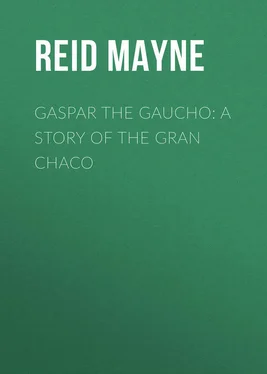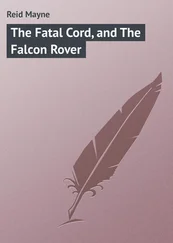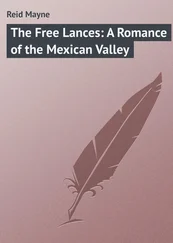Mayne Reid - Gaspar the Gaucho - A Story of the Gran Chaco
Здесь есть возможность читать онлайн «Mayne Reid - Gaspar the Gaucho - A Story of the Gran Chaco» — ознакомительный отрывок электронной книги совершенно бесплатно, а после прочтения отрывка купить полную версию. В некоторых случаях можно слушать аудио, скачать через торрент в формате fb2 и присутствует краткое содержание. Жанр: literature_19, foreign_antique, foreign_prose, на английском языке. Описание произведения, (предисловие) а так же отзывы посетителей доступны на портале библиотеки ЛибКат.
- Название:Gaspar the Gaucho: A Story of the Gran Chaco
- Автор:
- Жанр:
- Год:неизвестен
- ISBN:нет данных
- Рейтинг книги:3 / 5. Голосов: 1
-
Избранное:Добавить в избранное
- Отзывы:
-
Ваша оценка:
- 60
- 1
- 2
- 3
- 4
- 5
Gaspar the Gaucho: A Story of the Gran Chaco: краткое содержание, описание и аннотация
Предлагаем к чтению аннотацию, описание, краткое содержание или предисловие (зависит от того, что написал сам автор книги «Gaspar the Gaucho: A Story of the Gran Chaco»). Если вы не нашли необходимую информацию о книге — напишите в комментариях, мы постараемся отыскать её.
Gaspar the Gaucho: A Story of the Gran Chaco — читать онлайн ознакомительный отрывок
Ниже представлен текст книги, разбитый по страницам. Система сохранения места последней прочитанной страницы, позволяет с удобством читать онлайн бесплатно книгу «Gaspar the Gaucho: A Story of the Gran Chaco», без необходимости каждый раз заново искать на чём Вы остановились. Поставьте закладку, и сможете в любой момент перейти на страницу, на которой закончили чтение.
Интервал:
Закладка:
A sense of delicacy hinders the naturalist from riding over to the Tovas town, and asking explanation why the chief delays keeping his word. In all such matters, the American Indian, savage though styled, is sensitive as the most refined son of civilisation; and, knowing this, Ludwig Halberger waits for Naraguana to come to him.
But when a second week has passed, and a third, without the Tovas chief reporting himself, or sending either message or messenger, the Prussian becomes really apprehensive, not so much for himself, as the safety of his red-skinned protector. Can it be that some hostile band has attacked the Tovas tribe, massacred all the men, and carried off the women? For in the Chaco are various communities of Indians, often at deadly feud with one another. Though such conjecture seems improbable, the thing is yet possible; and to assure himself, Halberger at length resolves upon going over to the tolderia of the Tovas. Ordering his horse saddled, he mounts, and is about to ride off alone, when a sweet voice salutes him, saying: —
“Papa! won’t you take me with you?”
It is his daughter who speaks, a girl not yet entered upon her teens.
“In welcome, Francesca. Come along!” is his answer to her query.
“Then stay till I get my pony. I sha’n’t be a minute.”
She runs back towards the corrals, calling to one of the servants to saddle her diminutive steed. Which, soon brought round to the front of the house, receives her upon its back.
But now another, also a soft, sweet voice, is heard in exhortation. It is that of Francesca’s mother, entering protest against her husband either going alone, or with a companion so incapable of protecting him. She says: —
“Dear Ludwig, take Caspar with you. There may be danger – who knows?”
“Let me go, tio ?” puts in Cypriano, with impressive eagerness, his eyes turned towards his cousin as though he did not at all relish the thought of her visiting the Tovas village without his being along with her.
“And me, too?” also requests Ludwig, the son, who is two years older than his sister.
“No, neither of you,” rejoins the father. “Ludwig, you would not leave your mother alone? Besides, remember I have set both you and Cypriano a lesson, which you must learn off to-day. There is nothing to fear, querida !” he adds, addressing himself to his wife. “We are not now in Paraguay, but a country where our old Friend Francia and his satellites dare not intrude on us. Besides, I cannot spare the good Caspar from some work I have given him to do. Bah! ’Tis only a bit of a morning’s trot there and back; and if I find there’s nothing wrong, we’ll be home again in little ever a couple of hours. So adios! Vamos , Francesca!”
With a wave of his hand he moves off, Francesca giving her tiny roadster a gentle touch of the whip, and trotting by his side.
The other three, left standing in the verandah, with their eyes follow the departing equestrians, the countenance of each exhibiting an expression that betrays different emotions in their minds, these differing both as to the matter of thought and the degree of intensity. Ludwig simply looks a little annoyed at having to stay at home when he wanted to go abroad, but without any great feeling of disappointment; whereas Cypriano evidently suffers chagrin, so much that he is not likely to profit by the appointed lesson. With the Señora herself it is neither disappointment nor chagrin, but a positive and keen apprehension. A daughter of Paraguay, brought up to believe its ruler all powerful over the earth, she can hardly realise the idea of there being a spot where the hand of “El Supremo” cannot reach and punish those who have thwarted his wishes or caprices. Many the tale has she heard whispered in her ear, from the cradle upwards, telling of the weird power of this wicked despot, and the remorseless manner in which he has often wielded it. Even after their escape into the chaco, where, under the protection of the Tovas chief, they might laugh his enmity to scorn, she has never felt the confidence of complete security. And now, that an uncertainty has arisen as to what has befallen Naraguana and his people, her fears became redoubled and intensified. Standing in the trellissed verandah, her eyes fixed upon the departing forms of her husband and daughter, she has a heaviness at the heart, a presentiment of some impending danger, which seems so near and dreadful as to cause shivering throughout her frame.
The two youths, observing this, essay to reassure her – one in filial duty, the other with affection almost as warm.
Alas! in vain. As the crown of the tall hat worn by her husband, goes down behind the crest of a distant ridge, Francesca’s having sooner disappeared, her heart sinks at the same time; and, making a sign of the cross, she exclaims in desponding accents: —
“ Madre de Dios ! We may ne’er see them more!”
Chapter Five.
A Deserted Village
Riding at a gentle amble, so that his daughter on her small palfrey may easily keep up with him, Halberger in due time arrives at the Indian village; to his surprise seeing it is no more a village, or only a deserted one! The toldos of bamboo and palm thatch are still standing, but untenanted – every one of them!
Dismounting, he steps inside them, one after the other, but finds each and all unoccupied – neither man, woman, nor child within; nor without, either in the alleys between, or on the large open space around which the frail tenements are set, that has served as a loitering-place for the older members of the tribe, and a play-ground for the younger.
The grand council room, called malocca , he also enters with like result; no one is inside it – not a soul to be seen anywhere, either in the streets of the village or on the plain stretching around!
He is alarmed as much as surprised; indeed more, since he has been anticipating something amiss. But by degrees, as he continues to make an examination of the place, his apprehensions became calmed down, these having been for the fate of the Indians themselves. His first thought he had entertained while conjecturing the cause of their long absence from the estancia , was that some hostile tribe had attacked them, massacred the men, and carried captive the women and children. Such tragical occurrences are far from uncommon among the red aborigines of America, Southern or Northern. Soon, however, his fears on this score are set at rest. Moving around, he detects no traces of a struggle, neither dead bodies nor blood. If there had been a fight the corpses of the fallen would surely still be there, strewing the plain; and not a toldo would be standing or seen – instead, only their ashes.
As it is, he finds the houses all stripped of their furniture and domestic utensils; these evidently borne off not as by marauders, but taken away in a systematic manner, as when a regular move is made by these nomadic people. He sees fragments of cut sipos and bits of raw-hide thong – the overplus left after packing.
Though no longer alarmed for the safety of the Indians, he is, nevertheless, still surprised and perplexed. What could have taken them away from the tolderia , and whither can they have gone? Strange, too, Naraguana should have left the place in such unceremonious fashion, without giving him, Halberger, notice of his intention! Their absence on this occasion cannot be accounted for by any hunting or foraging expedition, nor can it be a foray of war. In any of these cases the women and children would have been left behind. Beyond doubt, it is an absolute abandonment of the place; perhaps with no intention of returning to it; or not for a very long time.
Revolving these thoughts through his mind, Halberger climbs back into his saddle, and sits further reflecting. His daughter, who has not dismounted, trots up to his side, she, too, in as much wonderment as himself; for, although but a very young creature, almost a child in age, she has passed through experiences that impart the sageness of years. She knows of all the relationships which exist between them and the Tovas tribe, and knows something of why her father fled from his old home; that is, she believes it to have been through fear of El Supremo, the “bogie” of every Paraguayan child, boy or girl. Aware of the friendship of the Tovas chief, and the protection he has extended to them, she now shares her father’s surprise, as she had his apprehensions.
Читать дальшеИнтервал:
Закладка:
Похожие книги на «Gaspar the Gaucho: A Story of the Gran Chaco»
Представляем Вашему вниманию похожие книги на «Gaspar the Gaucho: A Story of the Gran Chaco» списком для выбора. Мы отобрали схожую по названию и смыслу литературу в надежде предоставить читателям больше вариантов отыскать новые, интересные, ещё непрочитанные произведения.
Обсуждение, отзывы о книге «Gaspar the Gaucho: A Story of the Gran Chaco» и просто собственные мнения читателей. Оставьте ваши комментарии, напишите, что Вы думаете о произведении, его смысле или главных героях. Укажите что конкретно понравилось, а что нет, и почему Вы так считаете.












